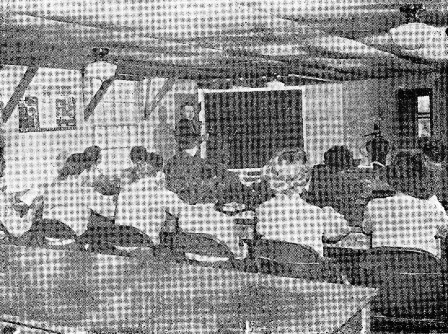
Vol. 1, No. 42 Published by India China Division, Air Transport Command November 8, 1945
Chinese Communists Spurn Chiang’s Proposal
|
Charge US Is Meddling Busybody
General Criticizes Yanks For Transporting Chinese Troops Chinese communists, criticizing the role played by U.S. forces in China and charging that the United States is meddling "in the guise of a policeman," last week spurned the latest proposal of Generalissimo Chiang Kai-shek's government which was aimed at avoiding a full-scale civil war. No. 2 Communist leader Gen. Chou En-Lai said there was "no necessity at all for the U.S. transportation of Kuomintang troops to areas which the communists have recovered from the Japanese." Latest such assistance, according to Army News Service, was the movement last week by the U.S. Seventh Fleet of government troops to the port of Chinwangtao, east of Peiping. No Direct Action The charge that the U.S. was a "meddlesome busybody" was publicized amidst reports of large-scale fighting between the two groups in China, particularly in the northern provinces. In printing the charge, the communist New China Daily News took issue with Lt. Gen. Albert C. Wedemeyer, US CG in the China Theater, and called action of his troops "direct interference in China's internal affairs." The communist newspaper also mentioned the possibility of U.S. forces becoming "involved" in the conflict if they remain. Gen. Wedemeyer said the assistance his forces were giving to the redistribution of Chinese government forces strengthened Generalissimo Chiang Kai-shek's position, but emphasized it did not constitute direct action against the communists. Should Chiang's troops be attacked by the communists while engaged in redeployment, he said, American troops in the area would be ordered to retire immediately. Station Captured Yenan and Chungking communist sources made the unsubstantiated charge that American reconnaissance preceded the capture by government troops of the communist-occupied town within ten miles of Peiping. Communist troops also had reported the capture of Peitaiho station in the Peiping-Mukden railroad, about ten miles southwest of Chinwangtao, which is held by American Marines. In Washington, White House sources said there had been no clashes between U.S. Marines and the communists, although there were reports from communist headquarters that our Marines had fired on communists representatives at Chinwangtao. The dispatch said the Chinese "had to reply to the fire," but withdrew after about an hour of hostilities. Meanwhile, Soviet and Chinese military authorities were reported to have agreed on arrangements for the landing of Kuomintang troops in Manchuria, ANS stated. |
|
Gen. Tunner Leaves ICD, Goes to US Receives Appointment As Commander Hq., Calcutta - Brig. Gen. Charles W. Lawrence, this week assumed command of the ICD, succeeding Brig. Gen. William H. Tunner who returned unexpectedly to the U.S. for a new assignment. Prior to his departure Gen. Tunner spoke briefly to his entire staff, paying high tribute to the officers and men of his command. He praised the record and ability of Gen. Lawrence who came to the division from the Fifth wing, 15th Air Force, and who recently has been acting as ICD deputy CG. New Era "During the year in which I have been your commander, you have taken more than 500,000 tons of war materials to China," Gen. Tunner said. "It has been a thoroughly impressive performance and every man who had a share in it has helped greatly to win the war. More than that, together and against odds, you have launched a new era - the age of mass air transport. It is something which even the best informed experts thought impossible, but you have proved it on the Hump." Eligibles Out Gen. Tunner expressed regret that he had been called home while the mission of ICD was yet unfinished and many of its personnel still in India. He said: "I leave, however, with the satisfaction that ICD is being demobilized faster than any other division of ATC and probably faster than any other organization in the entire AAF. It is scarcely two months since the end of the war with Japan, yet already nearly all ICD's two-year and eligible point men are on orders, released to the theater for shipment home. This is months ahead of departures in other theaters." In speaking of the new ICD commander, Gen. Tunner continued, "Under Gen. Lawrence's leadership I am confident that the division will progress rapidly and efficiently towards the day when it can say, 'mission completed, command demobilized, personnel departed.' To everyone in the ICD, I say goodbye and good luck. You have done a magnificent job." Gen. Tunner became commanding general of the ICD in September, 1944. Prior to that he had been commander of the Ferrying division of ATC. |
(Ed.-The following article was printed by the "New York Times." Our italicized interjections are contributed to keep the record straight.)
Camp Shanks, N.Y., Oct. 22 - Three WACs who spent 13 months in a jute mill cantonment on the Hooghly river, 18 miles from Calcutta, India, without leaving the isolated area where they were assigned, arrived here today preparatory to being mustered out at receptions centers near their homes.
(Yes, so "isolated" - despite its location in the center of a couple Indian villages, "suburbs" of Calcutta, second largest city in the British empire, to which half-hour bus service is available nightly.)
The three uniformed women (do they mean "uninformed"?), all of whom did office work at the headquarters of the Army Air Force assigned to Calcutta, are S/Sgt. Kathryn E. Pearson, of Morton, Pa.; Cpl. Hazel M. McKinney, of Baltimore, and Sgt. Alicia Simpson, Bryan, Tex., said to be the first WACs to arrive here from the isolated base. (Still isolated.)
Only Movies
The headquarters, camouflaged so it still looked like an old jute mill (camouflaged so effectively it fooled us; after more than 18 months in it, we still find it looking like a jute mill; it would take more than camouflaging to make it look otherwise) despite the 300 WACs and 2,000 soldiers stationed there, was equivalent to only one and one-half city blocks, the three veterans said.
The only organized amusement facilities were a movie at the end of the pier, and the chance to go to Calcutta twice a week. (How about regular dances, Red Cross programs, Snort club and stage shows? And unless they've changed the rules in the past six minutes, WACs, like GIs, may go to town any day and/or night they're off duty!) But there were so many sacred cows, so many bumps along the way and such mobs that in all 13 months some WACs never made the 18-mile (14, to be exact) trip once, they said.
Buffalo Steak
Quarters were so close, Sgt. McKinney said, "It was only 40 steps from my bed to my desk." The 300 WACs were quartered in one building, screened off (by brick walls) to separate their offices from the 300-bed dormitory they dubbed "the largest single bedroom in the world."
Every five WACs had a native Indian servant, an ayah, to make their beds and clean the dormitories. Additional native atmosphere was provided by servings of water buffalo steak (which, incidentally, hasn't been served here for almost a year, according to mess personnel; nothing but Australian beef now), considered a delicacy by the natives. "It tasted worse than the toughest roast beef I ever had in America," said Sgt. McKinney.
The dehydrated vegetables often remained wrinkled and shriveled despite efforts to coax them to normal size, the WACs reported. They had no milk after Aug. 7, 1944 (we're still waiting for our first taste since February, 1944) and none was on the boat that brought them home by way of the Suez canal and the Mediterranean in 21 days.
The homeward voyage completed a round-the-world trip started when they left New York over a year ago, went through the Panama canal to Australia to arrive in India 40 days later.
Although none of the three returnees married overseas, 15 of the WACs also stationed at the jute mill married service men there.
(Now we hope you guys in Assam, Burma and China who think YOU have had it rough know who REALLY suffered during the occupation of CBI.)
|
U.S.-Bound 1st Sgt. Gets Gift from GIs
Hq., Calcutta - Few tears are shed when the "typical" first sergeant departs from a squadron and many a first sergeant is lucky to suffer only groans and gripes at the hands of his men, but 1st Sgt. Sam P. Shinkle, of the ICD Headquarters squadron, did better than usual when he started getting ready to leave for the States.
At a squadron party Friday night, a large silver plaque for "meritorious service" was presented to Shinkle by the men of his outfit. Inscribed on it were details of his Army service and his work with the squadron.
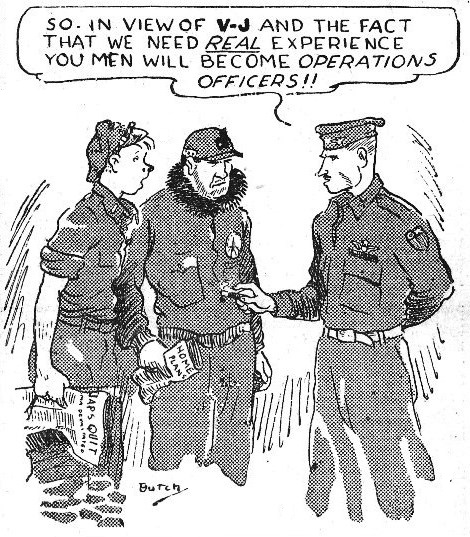
|

Time for Business
When, at the end of August, the United States cancelled lend-lease - as Pres. Truman had said we would do at the end of the war - Great Britain let herself get caught napping. She was unprepared. Churchill said he could not believe we would "roughly and harshly hamper a faithful ally." Attlee declared the sudden cessation of lend-lease put Britain in a serious financial position.
Immediately Pres. Truman offered to begin negotiations for a loan to tide Great Britain over immediate difficulties and help the British to reconstruct their national economy. The United States did not make this offer merely to benefit Britain. It is definitely to our interest to have that country on a sound financial footing.
Negotiations are now under way in Washington. The United States has offered Britain billions of dollars on a long-term, low-interest loan, but we want certain things in return - mainly the abandonment by Britain of her empire trade preferences.
Great Britain is quite willing to accept the loan but when it comes to making such concessions, it is a different matter. The British point out that the U.S. has not offered to lower her tariff barriers for Britain's benefit. Britain is right, we have not offered to lower our tariff barriers, but then we are not asking for a loan!
In connection with negotiating the loan, Lord Halifax has been pointing out to Americans "that Britain has made war sacrifices on every count, far in excess of America's." Lord Halifax has forgotten to mention, however, that Britain made these sacrifices for Britain, not for us, just as we made our sacrifices for the United States and not Britain.
The American people are too well known as sentimentalists. It is time the rest of the world, and we, learn we are not. When it comes to returning our loans, those who now want us to be sentimental will cry "Uncle Shylock" and become realists.
For too long our government has been sentimentalist in its foreign policy. It is time we grow up, become international adults instead of adolescents, realists instead of dreamers. We should be good neighbors, help our allies at every turn - but not at our expense.
We should be more than happy to make loans to Britain, to Russia and to the others who need money - but only as purely business propositions and only when there are clear-cut benefits for ourselves as a result.
Invective Poison
Sen. Theodore G. Bilbo (D. Miss.) again has snapped at the heels of his critics in an imitation of Harold Ickes, that old master in the art of invective. This time the senator's bark was turned on a group of college students.
We are idealists enough to believe that men who sit in the Senate of the United States should add to, not detract
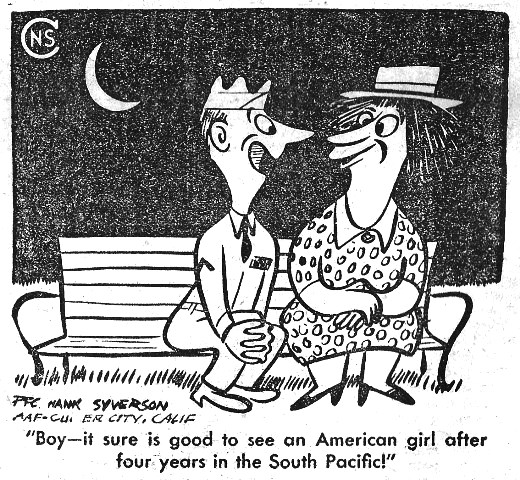
|
The remarks of the senator concerning "kikes," "dagoes," and "niggers" have a vaguely familiar ring, reminding us somewhat of similar remarks by Dr. Paul Joseph Goebbels, one of those largely responsible for the boys being in uniform for the past four years.
Each new critic of Bilbo calls forth new and if possible, more loathsome invective from him.
Critics have increased so fast, however, that his stock of abuse, unlike that of the master craftsman, Ickes, seems to be running low. In attacking the students of Hunter College, he was forced to use the old stand-by term, "communistic," though he did manage to add "mongrel congregation."
The senator might attach a cognomen to us that he did to the students - "youngsters" - for our belief that the hallowed halls wherein sat such men as Clay, Calhoun and Webster should not be desecrated by the presence of pygmy-minded, name-calling "little" men. We cannot see that Sen. Bilbo is adding to the glory of the congress of the United States by indulging in his juvenile name-calling habit.
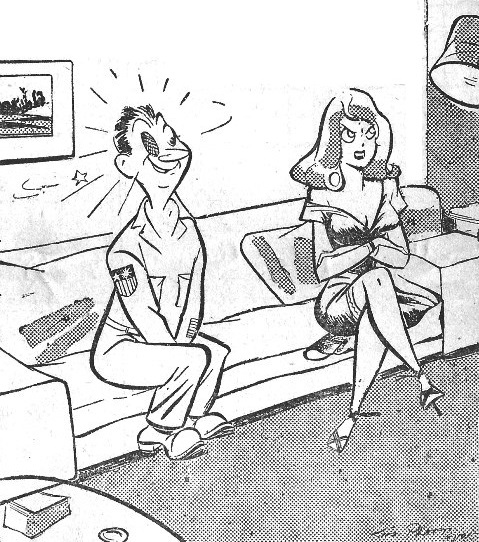 "Gosh . . . I've dreamed about this for months . . ."
"Gosh . . . I've dreamed about this for months . . ."
|
Fly Karachi WACs To Bases in States
Hq., Calcutta - One hundred and twenty-three ICD WACs will be flown back to the States from the 1306 BU this month, it was announced Wednesday by the headquarters personnel section. Those in this group, including two WAC officers, have been declared surplus and are being returned for reassignment to domestic bases. A Washington directive authorized their air travel to the U.S.
1300 BU Inspected By WAC Director On Overseas Tour
Hq., Calcutta - With Hastings airbase the fourth stop in a tour of all overseas theaters where WACs are stationed, Col. Westray Battles Boyce, WAC director, and a party of three arrived in Calcutta late Saturday night for a day's visit at 1300 BU.
The WAC director is making informal inspection of WAC stations to learn specifically what assignments the enlisted women have had, and to talk with them about postwar plans. She is especially interested in the number of EW who intend to take advantage of the GI Bill of Rights, and stressed advantages of the bill at a meeting of Hastings WACs Sunday afternoon.
Leaving the States Sept. 10, Col. Boyce stopped first in the Pacific. She was in Tokyo for three days, then at Shanghai, and left early Monday to interview ATC WACs in Karachi. She will go to ETO next.
HUMP EXPRESS is the official newspaper of the India-China Division, Air Transport Command, APO 192, c/o Postmaster, New York, N.Y., and is published by its Public Relations office. Camp Newspaper Service and Army Newspaper Service features are used, reproduction of which is prohibited without permission of CNS and ANS, 205 East 42nd St., New York, 17, N.Y. Other material is submitted by staff members, ICD-ATC base Public Relations sections and other soldier correspondents. Printed weekly by the Hindusthan Standard, 3 Burman St., Calcutta, India, and distributed each Thursday. Passed by U.S. Press Censor for mailing.
| Military transport schedules over India for cargo, personnel and mail . . . maximum tonnage of essential war materials over the Hump . . . movement of troops and supplies in support of tactical operations in China . . . evacuation of the sick and wounded - these are the missions of ICD-ATC. |

NOVEMBER 8, 1945
Original issue of HUMP EXPRESS shared by Barbara Skinner Lipiew
Copyright © 2018 Carl Warren Weidenburner
TOP OF PAGE PRINT THIS PAGE ABOUT THIS PAGE E-MAIL YOUR COMMENTS
PREVIOUS ISSUE HUMP EXPRESS BASE NEXT ISSUE
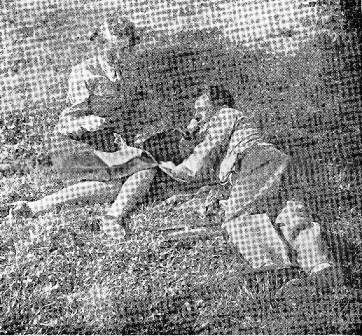 Kilmer college, the first army school in the States for servicemen and women not eligible for immediate discharge, commenced its full schedule recently
with 450 soldier students attending. The program is designed to promote educational and vocational training and guidance for GIs and WACs stationed at
Camp Kilmer, N.J., who wish to spend "time off" preparing for civilian occupations. To the many enrollees who plan to return to college, this school is
good indoctrination for campus life and concentration on studies which were interrupted several years ago. "On-the-job" training in several fields is
given, with the four-hour weekly class in auto mechanics having the highest registration thus far.
Below, smudge-faced WACs and soldiers pitch in and inspect a truck motor in a mechanics class instructed by a GI who has been in the Army for 16 years
but, as he says, "never with a job like this!" Training at Kilmer runs the gamut from purely vocational courses, such as this, to the more academic
subjects.
Kilmer college, the first army school in the States for servicemen and women not eligible for immediate discharge, commenced its full schedule recently
with 450 soldier students attending. The program is designed to promote educational and vocational training and guidance for GIs and WACs stationed at
Camp Kilmer, N.J., who wish to spend "time off" preparing for civilian occupations. To the many enrollees who plan to return to college, this school is
good indoctrination for campus life and concentration on studies which were interrupted several years ago. "On-the-job" training in several fields is
given, with the four-hour weekly class in auto mechanics having the highest registration thus far.
Below, smudge-faced WACs and soldiers pitch in and inspect a truck motor in a mechanics class instructed by a GI who has been in the Army for 16 years
but, as he says, "never with a job like this!" Training at Kilmer runs the gamut from purely vocational courses, such as this, to the more academic
subjects.
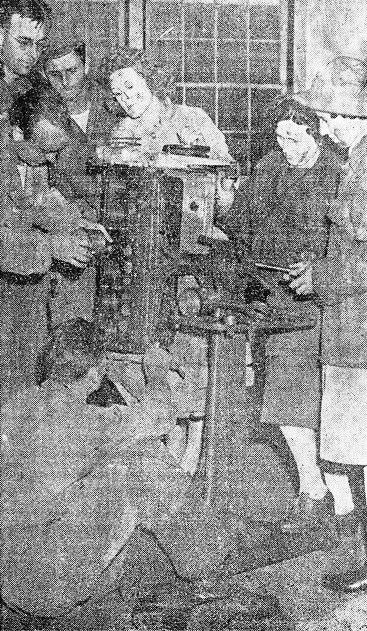
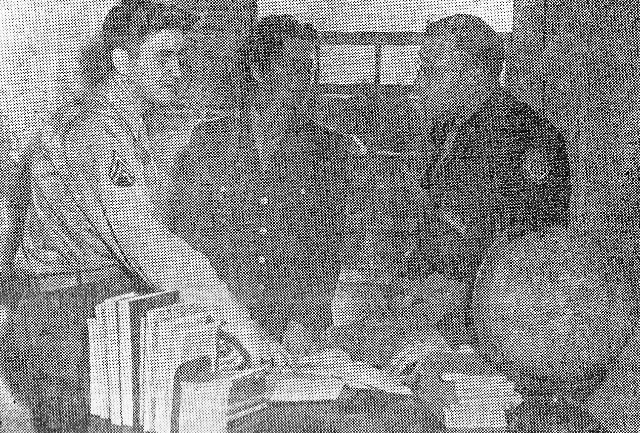 After months and years of performing routine army duties, the students find the mental exertion of classroom studies and return to a reasonable
facsimile of civvy life welcome.
Left, except for uniforms, this boy-girl scene could be at any Stateside co-educational college. The GI students are Cpl. June Connolly, Lynn, Mass.,
and Pfc. Herbert Wilen, Brooklyn, N.Y.
Above, Capt. Alfred Wasser, president of the school, plans the curriculum with Cpl. Dagobert De Levie, dean, and Pfc. Lillian De Puy, secretary-to-the-dean.
Four volunteer professors from Rutgers University, New Brunswick, N.J., and six qualified military instructors tech the courses.
After months and years of performing routine army duties, the students find the mental exertion of classroom studies and return to a reasonable
facsimile of civvy life welcome.
Left, except for uniforms, this boy-girl scene could be at any Stateside co-educational college. The GI students are Cpl. June Connolly, Lynn, Mass.,
and Pfc. Herbert Wilen, Brooklyn, N.Y.
Above, Capt. Alfred Wasser, president of the school, plans the curriculum with Cpl. Dagobert De Levie, dean, and Pfc. Lillian De Puy, secretary-to-the-dean.
Four volunteer professors from Rutgers University, New Brunswick, N.J., and six qualified military instructors tech the courses.
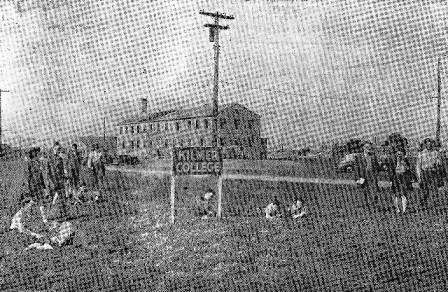 Above, the GI college green finds "co-eds" interested in books and in each other.
Below, Lt. Gordon J. Steiner teaches one of the two bookkeeping and accounting classes, the exceptionally large enrollment in this course making two
classes necessary. Other classes include one-hour weekly instruction in business administration, business law, public speaking, psychology, grammar and
four languages.
Above, the GI college green finds "co-eds" interested in books and in each other.
Below, Lt. Gordon J. Steiner teaches one of the two bookkeeping and accounting classes, the exceptionally large enrollment in this course making two
classes necessary. Other classes include one-hour weekly instruction in business administration, business law, public speaking, psychology, grammar and
four languages.
